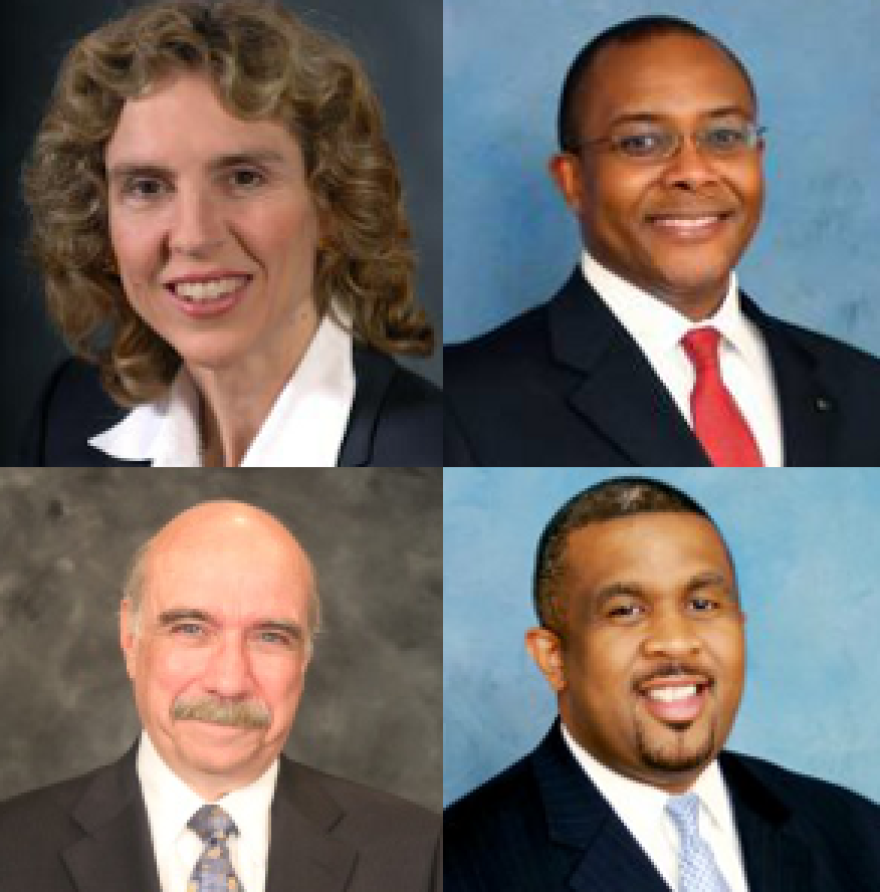Charlotte’s most recently elected mayors have had quite the trajectory—to the governor’s mansion, U.S. Cabinet, and federal prison. In total, the city has gone through five mayors in as many years. This year, six Democratic candidates are vying for the office.
Four of the candidates have serious campaign presences and fundraising—including the current, appointed mayor, two sitting city councilmen, and a former county commission chair with an aggressive campaign and a large fundraising head start (read about the Republican candidates here).
Mayor Pro TemMichael Barnes has served longest, ten years. He’s considered one of the council’s most conservative Democrats.
"I consider myself a moderate, but ultimately I don’t really care what people think of the label,” Barnes says. “That’s their business. I just do what I think is right for the city."
Barnes voted against the city’s most recent budget. He favored more cuts instead of a property tax increase to help fill a deficit.
Councilman David Howard was on the other side of that vote. He has spent his three terms on the left of the city council.
“I went to West Charlotte, for anybody listening, and to UNC Charlotte. I’d be the first 49er ever elected mayor of Charlotte,” Howard says. “It’s never happened, go figure that.”
Both Howard and Barnes have expressed upset about the run of current mayor Dan Clodfelter. After 15 years as a state senator representing Mecklenburg County, the city council appointed him when mayor Patrick Cannon resigned amid a corruption scandal. But that came with a condition, Barnes says.
“There’s been this gentlemen’s agreement—gentleperson’s agreement—that people won’t run,” says Barnes. “Dan committed to that and subsequently changed his mind, so that’s been quite disappointing to me, but that’s the nature of politics.”
“I discovered that I like the job,” Clodfelter replies. “I think I was pretty good at the job, and felt like there were some things I didn’t really want to walk away from and leave undone.”
Clodfelter rarely takes formal positions, but the council often taps his legislative knowledge, particularly for insight into state lawmakers’ actions. That includes cuts to local revenue. Clodfelter thinks the relationship with Raleigh requires renegotiating.
“Look, the state has changed,” he says. “We have major urban centers that we didn’t have in the 1930s now, and one of the things we need to say is ‘give us a little more flexibility, give us a little more autonomy.’”
Clodfelter says that comes with a trade-off: more control over its own affairs also means more taxing and spending authority.
Councilman David Howard has a different take.
"What I’ve heard from them [state lawmakers] is they want us to rely on tools they’ve given us already,” says Howard. “Whether we like it or not we can raise property taxes, whether or not we like it, we have control over fees. We have the ability to do special assessment districts.”
All of the candidates agree the next mayor needs to work to build bridges with state lawmakers.
“We are interdependent,” says Jennifer Roberts, the fourth candidate in the race. “And I think a lot of it is about communicating that, and helping everyone understand that it is a common goal for us to move our state forward, as well as our city.”
Roberts chaired the Mecklenburg County Board of Commissioners for five years, until 2012. She ran for U.S. Congress, losing to Representative Robert Pittenger. The experience shows in her mayoral campaign, which includes pollsters, a research firm, and consultants.
“It is evident that I’m the only woman in the race,” says Roberts. “And as a wife and mother I understand from a unique perspective what our working families are facing in Charlotte.”
Roberts leads in fundraising, as of July, with $300,000 over more than a year of campaigning, according to her most recent campaign financial report. Clodfelter ranks second with about $180,000 after starting later last year. He, too, has invested heavily in consultants and pollsters.
Howard didn’t begin fundraising until this year, but has pulled in the most since--$160,000 through June while spending little. Barnes trails with about $50,000 total.
Major campaign issues could include Charlotte’s budget, influence from state lawmakers, the Randall Kerrick trial, economic incentives, and the new streetcar, and its planned $150 million extension. Three candidates support it—Roberts, Howard, and Clodfelter.
“It’s more than transportation, it’s an economic development tool,” Roberts sums up that view.
Barnes says he thinks the streetcar is irresponsible, although he supported the light rail.
“The Blue Line has at least five funding sources,” Barnes says, pointing to federal, state, and local funding, as well as a transportation tax and fares. “Up to this point, the streetcar has had two funding sources, taxes from the city and a federal grant.”
Whoever’s ultimately elected will have a say, but not a vote. Charlotte has what’s called a “weak mayor” form of government, and the office has few formal powers. Howard says it’s not about that.
“In years past we’ve had very powerful mayors who went on to be secretary of transportation and governor because they actually knew how to use the power of mayor, which is not about a vote,” Howard says.
The candidates have several steps before they can use that power. The primary election takes place September 15, followed by a runoff if none receives more than 40 percent of the vote.
Hear the full interviews with these candidates and their Republican counterparts on our podcast The 15th Floor.



